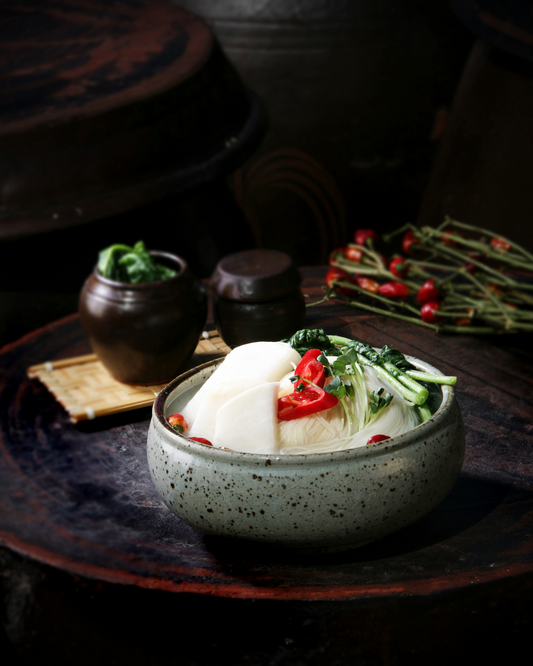Are you searching for a healthy diet but missing out on a gem? Let's explore the vibrant world of kimchi. This Korean cornerstone is not just spicy; it's packed with nutrition in every bite. It's rich in vitamins and full of minerals, making it much more than a side dish. It's a blend of taste and health benefits. Kimchi is known for boosting skin health and vision. It also helps keep bones strong. This food is a mix of essential nutrients your body needs.
Kimchi's magic starts with fermentation. It turns simple ingredients like cabbage and garlic into health powerhouses. For example, garlic fights off diseases and gives kimchi its ability to battle cancer. The fermentation process also creates good bacteria that help your gut and reduce inflammation. Kimchi is packed with vitamins A, B6, C, and K. It also has minerals like iron, potassium, and calcium. This food boosts your immune system, helps your digestive system, and might even help you manage your weight thanks to its probiotics.
Key Takeaways
- The fermentation in kimchi results in probiotics similar to those in fermented dairy, aiding in gut health and potentially reducing inflammation.
- Rich in essential nutrients, kimchi supports bone density maintenance and enhances skin health and vision through its vitamin and mineral content.
- Consuming kimchi may assist in weight control, as evidenced by studies linking it with lower obesity rates and body fat loss.
- Despite its high sodium content, research indicates that kimchi consumption does not necessarily increase blood pressure levels.
- Preparation and storage are crucial for safe consumption due to risks of food poisoning from improperly handled kimchi.

Vitamins in Kimchi Ingredients
Kimchi is a key food in Korean meals, famous for bold tastes and health perks. It's rich in vitamins which boost overall health.
Vitamin C: The amount of vitamin C in kimchi ingredients and its health benefits.
Kimchi is a top source of vitamin C, vital for immune support and skin health. A cup of kimchi has about 22% of the vitamin C you need each day. This antioxidant aids tissue repair, enhances immunity, and battles free radicals. Cabbage and radishes, used in making kimchi, are where a lot of the vitamin C comes from.
Vitamin A: Main sources of vitamin A and the effects of kimchi on skin and vision health.
Vitamin A in kimchi is another key nutrient, helping keep vision and skin healthy. It mostly comes from cabbage and greens like spinach, full of beta-carotene. This beta-carotene, an antioxidant, steps up kimchi's health game by fighting free radicals.
Vitamin K: The role of vitamin K in kimchi ingredients and its impact on maintaining bone density.
Kimchi is rich in vitamin K, crucial for blood clotting and bone health. Cabbage and celery in kimchi give it lots of vitamin K, about 55% of what you need daily. So, kimchi is good for strong bones and proper blood clotting.
To wrap it up, kimchi isn't just tasty. It's a healthful food, loaded with vital vitamins and antioxidants. These nutrients boost many health aspects.

Minerals in Kimchi Ingredients
Exploring the mineral content of kimchi reveals it's packed with vital nutrients. Key minerals like potassium, calcium, and magnesium are fundamental for health. They play important roles in keeping us well.
Potassium: The impact of potassium on regulating blood pressure and maintaining fluid balance in the body
Kimchi is rich in potassium. This nutrient helps control blood pressure and manage the body's fluid balance. Ingredients such as radishes and cucumbers in kimchi variants like Ggakdugi and Oi Sobagi contribute to these benefits. They support heart health and metabolic functions.
Calcium: The effects of calcium in kimchi on bone health and muscle function
Kimchi provides calcium essential for strong bones and muscle function. This mineral, with magnesium, helps muscles work and nerves communicate. Offering around 40mg per serving, kimchi aids daily calcium intake. It helps build bone density and keep muscles working well.
Magnesium: The importance of magnesium and its sources from kimchi ingredients
Magnesium from kimchi supports muscle and nerve functions. It's abundant in leafy greens and certain seasonings found in kimchi types such as Yeolmu Kimchi and Baek Kimchi. This mineral assists over 300 enzymes in the body. It's crucial for creating DNA and proteins. Magnesium also contributes to bone structure. This highlights kimchi's broad benefits from its varied ingredients.

Antioxidant Components in Kimchi
Kimchi, a traditional Korean dish, is famous for its distinct taste and health perks. Its antioxidants are especially notable. These antioxidants, like phenolic compounds, curcumin, and quercetin, help fight oxidative stress.
Phenolic Compounds
Research shows kimchi fights oxidative stress with phenolic compounds. One study found that adding black raspberry juice powder increases these compounds. This leads to more antioxidant activity. Thus, kimchi with more phenolic compounds can fight diseases from oxidative stress. This shows how vital antioxidants are for health.
Curcumin and Quercetin
Curcumin and quercetin are known for fighting oxidative stress. These substances in kimchi boost its health benefits. For example, rats with liver problems improved after eating kimchi with black raspberry juice powder. Their liver health got better, and antioxidant levels rose. This shows curcumin and quercetin in kimchi help reduce oxidative stress.

Dietary Fiber in Kimchi Ingredients
Scientists have recently found that traditional foods like kimchi are rich in dietary fiber. Fermentation does more than keep the veggies fresh. It also adds healthy lactic acid bacteria. These bacteria help make essential vitamins for our health. Kimchi, loaded with fiber, helps our digestive system by supporting a variety of good gut bacteria.
Benefits of Dietary Fiber
Kimchi's dietary fiber comes mainly from cabbage, radishes, and carrots. These ingredients are known for their health perks. Each 100g serving of kimchi provides about 1.8 grams of fiber. This not only helps with digestion but also keeps bowel movements regular. It may relieve symptoms of Irritable Bowel Syndrome (IBS) too. High fiber foods like kimchi are also good for managing weight. This is important for reducing risks related to obesity, especially during COVID-19.
Gut Health
Eating kimchi often is good for your gut health. It introduces beneficial bacteria such as Lactobacillus sakei into your system. These good bacteria from the fermentation process are vital for a strong digestive system. Kimchi's probiotics are essential for maintaining gut health.
But kimchi does more than just help your gut. It has been shown to improve metabolism, lower cholesterol levels, and reduce inflammation. These benefits make it a popular choice for those looking to eat healthier. However, because kimchi is high in salt, those watching their sodium intake should eat it in moderation.
FAQ
What vitamins and minerals are found in kimchi and how do they benefit health?
Kimchi is packed with vitamins and minerals that boost our health. These include improving our skin, eyesight, and bones. It's rich in Vitamin A, B6, C, and K. You'll also find minerals like iron, potassium, and calcium in kimchi.
How much vitamin C is in kimchi and what are its health benefits?
Half a cup of kimchi gives you 18mg of Vitamin C. This is great for your immune system and keeps your skin healthy.
What are the main sources of vitamin A in kimchi and how does it affect skin and vision health?
Vitamin A in kimchi comes from veggies like cabbage. They're full of beta-carotene which helps keep your skin and eyes healthy. It also fights off free radicals.
What role does vitamin K play in kimchi ingredients and how does it impact bone density?
Vitamin K, found in cabbage, helps your blood clot and keeps your bones strong. It's key for your bone health.
What impact does potassium in kimchi have on blood pressure regulation and fluid balance?
Potassium in kimchi helps control blood pressure and keeps your body's fluids in balance. It's mainly found in radishes and cucumbers.
What are the effects of calcium in kimchi on bone health and muscle function?
With about 40mg per serving, calcium in kimchi strengthens bones and helps muscles function properly.
Why is magnesium important and what are its sources in kimchi ingredients?
Magnesium plays a big role in our bodies. It keeps muscles and nerves working right. You'll find it in kimchi ingredients like leafy greens and seeds.
What antioxidants are present in kimchi ingredients and what are their health benefits?
Kimchi has antioxidants such as phenolic compounds in garlic and peppers. They help reduce inflammation and might prevent some chronic diseases.
How do kimchi's antioxidant components like curcumin and quercetin affect oxidative stress in the body?
Curcumin and quercetin in kimchi fight oxidative stress. This lowers inflammation and reduces the effects of harmful proteins.
What are the health benefits provided by the dietary fiber in kimchi?
Kimchi's dietary fiber, about 2 grams per cup, helps with gut health and digestion. It supports colon health and improves bowel movements.
How does the dietary fiber in kimchi positively impact gut health?
The fiber in kimchi keeps your digestive system healthy. It balances gut bacteria and eases symptoms of gastrointestinal issues with its probiotics.








